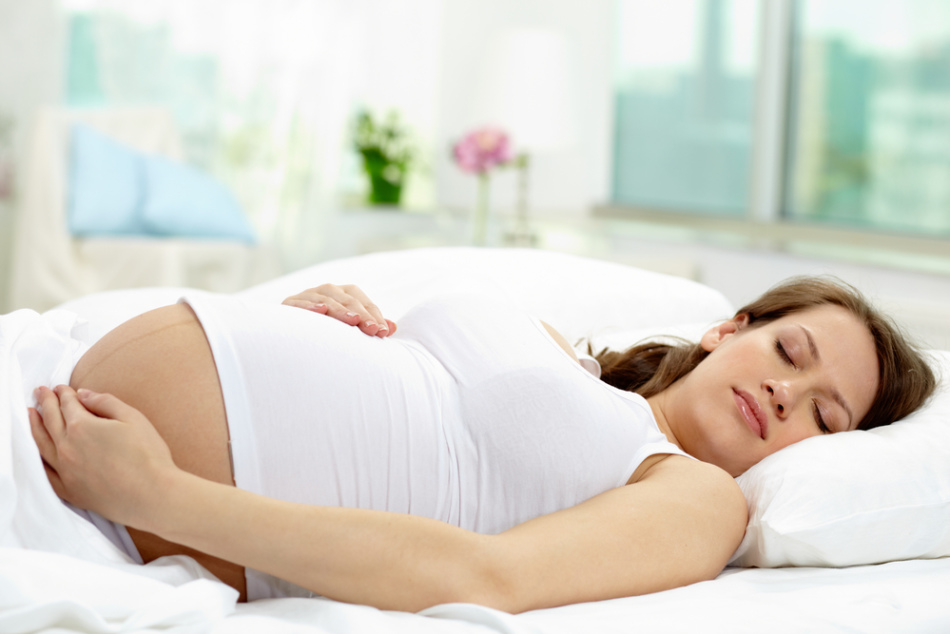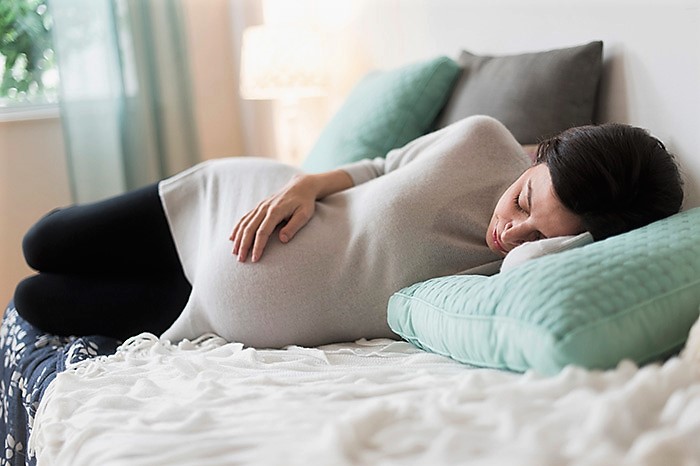Sleeping on side while pregnant
Right Side vs. Left Side, More
From steering clear of your favorite contact sports to shunning certain foods, the do’s and don’ts list of pregnancy can be a bit overwhelming.
And as your belly grows week after week, you may be adding sleep positions to your list of concerns.
Here’s some help wading through the myths and facts related to sleep positions during pregnancy and how the way you rest affects the health of your baby and you.
Related: 11 foods and beverages to avoid during pregnancy
Doctors generally recommend sleeping on your side during pregnancy, especially as time goes on.
Why is this exactly? It boils down to blood flow. As the fetus gets bigger, there is greater chance of compression of the blood flow to the uterus.
However, doctors still continue to tilt patients when they are lying down during a cesarean delivery, commonly called a c-section, or when they are in labor with abnormal heart rhythms.
A 2019 review of medical studies suggests that sleeping on your back carries risks, but it doesn’t seem to matter whether you sleep on your right or left side.
These studies do have some flaws, though. Third trimester pregnancy loss is very uncommon. Therefore, there aren’t many cases from which to draw conclusions.
Additionally, it’s difficult to determine exactly when the fetus passed away and whether there were other factors involved. It can be challenging to pinpoint what is occurring in utero without monitoring.
The study did find, however, that there was an increased risk of stillbirth for back sleepers after 28 weeks.
There’s a lot of mixed data on whether lying flat on your back during pregnancy contributes to an increased risk of stillbirth.
A 2019 study of about 800 women for up to 30 weeks of pregnancy examined the sleeping positions of those who experienced stillbirths.
The researchers found no association between those who reported sleeping on their back or a non-left side sleeping position.
Currently, only a limited number of studies are available on this topic. More research is needed to be certain whether or not there is an association between stillbirths and sleeping positions up to 30 weeks of pregnancy.
Left side
Sleeping on your left side is often referred to as the “ideal” scenario during pregnancy.
Positioning yourself on the left side of your body allows for optimal blood flow from the inferior vena cava (IVC).
This large vein runs parallel to your spine on the right side and carries blood to your heart and, in turn, to your baby.
Sleeping on your left side also takes the pressure off your liver and your kidneys. This means more room to function properly, helping with swelling issues in your hands, ankles, and feet.
Right side
So, if the left side is ideal — should you avoid the right side? Not necessarily.
That 2019 review showed equal safety with sleeping on the left and right sides. There’s a slight risk of compression issues with the IVC when you sleep on the right, but it’s mostly a matter of where you’re comfortable.
A note about baby’s sex
You may have heard that your sleep side indicates the sex of your baby. This is just an urban legend. There are no studies to suggest that sleep position has any correlation to the sex of your baby.
This is just an urban legend. There are no studies to suggest that sleep position has any correlation to the sex of your baby.
Related: Can belly shape in pregnancy predict you’re having a boy?
If side sleeping isn’t your thing, here are some suggestions for how to make it feel more natural or at least comfortable.
If you’re especially concerned about your sleeping position, you may even ask your partner to check on you from time to time and help nudge you into a better position.
First trimester
Sleeping in any position is generally fine early on. But if you want to get into the habit of favoring your side, try simply slipping a pillow between your legs. This may ease discomfort in your hips and lower body.
And if you want to be a little, well, extra, you could consider getting an orthopedic knee pillow that’s made of memory foam.
Second trimester
As your belly grows, you’ll want to make sure your mattress is somewhat firm so your back doesn’t sag. If yours is too soft, you might consider slipping a board between your mattress and box spring.
If yours is too soft, you might consider slipping a board between your mattress and box spring.
You may also want to look into pregnancy pillows. They come in U or C shapes and wrap around your entire body to help with side sleeping.
You position the pillow so that it runs along your back and then hug the front while simultaneously slipping it between your knees.
Third trimester
Continue using a pregnancy pillow for support. If you find them a bit cumbersome with your growing belly, investigate wedge pillows. You can stick them under your belly and behind your back to keep from rolling.
If you simply can’t get used to sleeping on your side, try using pillows to prop your upper body at a 45-degree angle. This way, you’re not flat on your back and you take the compression off your IVC.
Alternatively, you can try elevating the head of your bed a couple inches with books or blocks.
Wondering if you can sleep on your stomach during pregnancy? You sure can — at least for a while.
Stomach sleeping is OK until you reach about weeks 16 to 18. At that point, your bump may be growing a bit bigger, making this position less and less desirable. It may feel a bit like you’re trying to sleep atop a watermelon.
Besides comfort, though, there isn’t much to worry about if you somehow find yourself on your stomach. The uterine walls and amniotic fluid protect your baby from being squished.
To make this position more comfortable, you may consider purchasing a stomach sleeping pillow. Some are inflatable and some are more like a firm pillow with a large cutout for your belly.
Whatever one you choose, the idea is that you get some shut-eye on your stomach while giving your baby (and you) plenty of room to breathe.
Related: How to kick insomnia in early pregnancy
Sleeping on your back is generally considered safe throughout the first trimester.
After that, you may have heard that studies link sleeping the whole night on your back to stillbirth. Before you get too worried, understand that the studies are small and there may be other factors like sleep apnea at play.
Before you get too worried, understand that the studies are small and there may be other factors like sleep apnea at play.
Nevertheless, these studies can’t be completely discounted. In the end, not sleeping on your back may lower your risk of stillbirth after 28 weeks by 5.8 percent.
Plus, there are other issues with sleeping on your back. This position may contribute to back pain, hemorrhoids, digestive issues, and poor circulation. It may also make you feel lightheaded or dizzy.
Should you worry if you wake up on your back in the middle of the night? Likely not — but it’s a good idea to try another position.
If you’re a solid sleeper (lucky you!) and often find yourself on your back, consider placing a wedge pillow behind you.
That way, when you try to roll onto your back, you’ll stop at an angle that will still allow blood to flow and nourish your baby.
Related: Your guide to sleeping on your back during pregnancy
Shop for pregnancy pillows online
- wedge pillows
- stomach sleeping pillows
- side sleeping pillows
- orthopedic knee pillows
There’s a lot you may worry about during your pregnancy. Your sleep position doesn’t need to be top of the list.
Your sleep position doesn’t need to be top of the list.
Doctors recommend resting on your side — right or left — to give you and your baby the optimal blood flow. Beyond that, you might try using some pillow props to get into the most comfortable position for you.
Soak in all the sleep you can before your baby is born. And consult with your doctor if you have other questions about which position is best.
For more pregnancy guidance and weekly tips tailored to your due date, sign up for our I’m Expecting newsletter.
Best Sleeping Positions While Pregnant
The best sleep position during pregnancy is “SOS” (sleep on side) because it provides the best circulation for you and your baby. It also places the least pressure on your veins and internal organs. Sleeping on your left side will increase the amount of blood and nutrients that reach the placenta and your baby. Plus good circulation helps reduce potential swelling, varicose veins in your legs and hemorrhoids.
How Can I Sleep More Comfortably During Pregnancy?
Keep your legs and knees bent, and put a pillow between your legs to relieve the stress on your back.
- If you find that you are having problems with back pain, use the “SOS” position, and try placing a pillow under your abdomen as well.
- If you are experiencing heartburn during the night, you may want to try propping your upper body with pillows.
- In late pregnancy, you may experience shortness of breath. Try lying on your side or propped up with pillows.
These suggestions may not sound completely comfortable, especially if you are used to sleeping on your back or stomach, but try them out. You may find that they work. Keep in mind that you may not stay in one position all night, and rotating positions is fine.
What Sleep Positions During Pregnancy Should I Avoid?
Sleeping on your back: This can cause problems with backaches, breathing, the digestive system, hemorrhoids, low blood pressure and cause a decrease in circulation to your heart and your baby. This is a result of your growing abdomen resting on your intestines and major blood vessels (the aorta and vena cava). You can also develop sleep apnea as you put on weight.
This is a result of your growing abdomen resting on your intestines and major blood vessels (the aorta and vena cava). You can also develop sleep apnea as you put on weight.
Sleeping on your stomach: When you are farther along in your pregnancy, your breasts become more tender and your abdomen continues to grow, both making sleeping on your tummy uncomfortable. Using a donut-shaped pillow (with a hole in the middle) may help you sleep comfortably on your stomach.
Reasons for your discomfort may include:
During pregnancy, you may find yourself wrestling in bed trying to get comfortable before falling asleep. When you are pregnant your body goes through a variety of changes causing your regular sleeping positions to no longer work for you.
- Increased size of the abdomen
- Back pain
- Heartburn
- Shortness of breath
- Insomnia
More Steps to Sleeping Better While Pregnant
- Limit caffeine.
 Try not to drink coffee or caffeinated tea after 3 p.m.
Try not to drink coffee or caffeinated tea after 3 p.m. - Brink plenty of water. Drink lot of water through out the day, but limit intake a couple of hours before bedtime so you don’t have to wake up and go to the bathroom.
- Exercise for 30 minutes. Exercise helps you sleep better, but don’t exercise within four hours of bedtime.
- Relaxing activities. A warm bath, foot or shoulder massage will help you relax.
- Peaceful bedroom. Keeping your bedroom dark, quiet and cool at night will help to drift off to sleep and stay asleep.
- 7 Discomforts of Pregnancy
- Nighfood Nighttime Ice Cream
- Pregnancy Week 15
Compiled using information from the following sources:
1. Nemours Foundation
https://www.kidshealth.org
1. Your Pregnancy Week by Week Fifth Ed. Curtis, Glade B., OB/GYN, et al. Week 16
Curtis, Glade B., OB/GYN, et al. Week 16
How to sleep during pregnancy
It is difficult to overestimate the role of sleep in the life of every person. A complete healthy rest allows you to fully restore the functioning of the nervous system, relieve stress, improve performance and increase activity. Chronic sleep deprivation is the cause of many diseases. What can we say about a woman who is at the stage of bearing a baby. During this period, more than ever, she needs a healthy, long and full sleep. However, unfortunately, it is during this period that one can only dream of a restful sleep.
As soon as a woman finds out about her new position, she has to give up a lot for the sake of the health of her unborn baby. And you need to give up not only bad habits: alcohol, cigarettes, coffee, but also from a comfortable sleep.
The cause of insomnia can be :
- Anxiety;
- Frequent urination;
- Fears and phobias before a new stage of one's life;
- Nervousness and irritability;
- Digestive disorder;
- Toxicosis;
- Physical indisposition;
- Uncomfortable posture.

During the period of bearing a child, the female body experiences an extraordinary load, especially in the last trimester. The need for more sleep increases, because the body expends much more energy. Therefore, healthy sleep and pregnancy are inextricably linked.
As soon as a woman finds out about her new position, she has to give up a lot for the sake of the health of her unborn baby. And you need to give up not only bad habits: alcohol, cigarettes, coffee, but also from a comfortable sleep.
Let's try to figure out how to sleep during pregnancy, so as not only not to harm the health of your unborn baby, but to sleep well.
Looking for a comfortable sleeping position
Each person has his own favorite position, in which it is easy to fall asleep and sleep. Many do not imagine a comfortable rest on their backs, accustomed to sleeping on their stomachs. This habit will have to be sacrificed, as it is unsafe for the normal development of the fetus. If in the first three months of pregnancy a woman can still sleep in the position in which she is used to and feels comfortable, then after the first trimester the growing belly will not allow her to lie safely in this position. Despite the natural protection of the baby in the form of amniotic fluid, there is a high probability of injuring the baby in a dream, squeezing it. But what is the right way to sleep during pregnancy?
If in the first three months of pregnancy a woman can still sleep in the position in which she is used to and feels comfortable, then after the first trimester the growing belly will not allow her to lie safely in this position. Despite the natural protection of the baby in the form of amniotic fluid, there is a high probability of injuring the baby in a dream, squeezing it. But what is the right way to sleep during pregnancy?
Back position
Even if you are used to sleeping in a Spartan position, on your back, with your arms spread wide, from the 28th week you will have to radically change your lifestyle. The fact is that as the fetus grows, the load on the intestines and vena cava will increase significantly, blocking the access of oxygen to the baby.
As soon as a woman finds out about her new position, she has to give up a lot for the sake of the health of her unborn baby. And you need to give up not only bad habits: alcohol, cigarettes, coffee, but also from a comfortable sleep.
If you sleep on your back during pregnancy, you may experience the following problems:
- Dizziness;
- Nausea;
- Convulsions;
- Numb limbs;
- Pressure reduction;
- Hemorrhoids;
- Heaviness of breathing.
If you feel these symptoms or the baby gives persistent signals, you need to urgently change your position, so squeezing the vena cava is fraught not only with poor health for the mother, but also with a lack of oxygen supply to the fetus.
Stomach position
One of the most beloved positions for many people, which allows you to quickly fall asleep while hugging a pillow. Many women, as soon as they find out about the change in their lives, are interested in the question, is it possible to sleep on your stomach during pregnancy? Doctors recommend abandoning this position already in the first weeks, even before the enlarged belly makes it impossible to fall asleep peacefully.
If you are afraid during sleep, without controlling your movements, to arbitrarily roll over on your stomach, you can put a large pillow that does not allow you to change position.
Side position
In order to normalize your sleep and not harm the health of the baby, experts recommend sleeping on your side during pregnancy. And if at first this option seems unacceptable to many, after the second trimester, lying on your side is the only possible one. But here the question arises, on which side to sleep in order to ensure the safety of the fetus?
Sleeping on the right side can cause squeezing of the kidney, which can have dire consequences. The ideal posture is lying on the left side. Thus, you not only do not injure the unborn baby, but also improve blood flow along with oxygen to the placenta.
But one should not ignore the individual characteristics of each organism and the position of the fetus in the uterus. When the baby is in a transverse position, choose the side where the baby's head is. And with a breech presentation, doctors recommend changing the position several times a night.
If you still cannot improve your sleep, you feel unwell and you are tormented by insomnia, then it is better to consult a specialist. A good gynecologist will analyze the situation and help solve the problem. If necessary, he will prescribe a safe sedative that stabilizes the emotional state and helps to fall asleep calmly, resting and restoring the nervous system in a dream.
A good gynecologist will analyze the situation and help solve the problem. If necessary, he will prescribe a safe sedative that stabilizes the emotional state and helps to fall asleep calmly, resting and restoring the nervous system in a dream.
Help pillow
Fortunately, now modern manufacturers help women survive the pregnancy period with great comfort by offering special pillows. They are made taking into account the physiological characteristics of a woman in this period and allow you to find a comfortable position for relaxation.
You can buy two pillows and put one under your stomach and the other under your knees, looking for your best option. And you can buy a long banana-shaped pillow, which allows you to throw your leg on it while sleeping, which improves well-being and relieves the main load from the lower back and abdomen. Already in the last weeks of pregnancy, when the growing belly does not allow you to breathe normally, the pillow will allow you to take a comfortable half-sitting position.
Remember that pregnancy is your opportunity to gain strength and fully relax before the most crucial period in your life. Childbirth and the first weeks of caring for your baby will require a lot of energy from you, so good luck and sound sleep!
What position to sleep in during pregnancy?
As South Korean scientists have found, mandarin helps fight obesity by reducing the amount of fat deposits in the liver and abdominal cavity.
Sleep during pregnancy brings a lot of inconvenience to a woman. Heartburn, frequent urge to urinate, shortness of breath, bouts of insomnia, back pain.
To get the most comfortable sleep in the upcoming months of pregnancy, read our guide.
Sleep on your back.
When you sleep on your back it is safe during the 1st trimester. When the body is on the back, the stomach and uterus put pressure on the main vein, which returns blood from the lower body to the heart. Thus, while lying on your back, you may feel dizzy, nauseous, and it is more difficult for blood and nutrients to reach the placenta.
Thus, while lying on your back, you may feel dizzy, nauseous, and it is more difficult for blood and nutrients to reach the placenta.
In addition, back pain, shortness of breath, problems with the digestive system, hemorrhoids, and low blood pressure may occur.
Sleeping on the stomach.
After 20 ti weeks to sleep on a stomach it is simply not convenient. Imagine that you are sleeping on a huge watermelon! By the way, do not be afraid to sleep in this position, you can not hurt the child. Even at nine months, the walls of the uterus provide sufficient protection for the baby. From a medical point of view, sleeping in this position is safe but uncomfortable.
Sleep on the side.
The best way to sleep comfortably through the night is to sleep on your side, especially on your left side. So you provide maximum blood flow for the baby and does not put pressure on the liver. Place a pillow between your legs for comfort.












